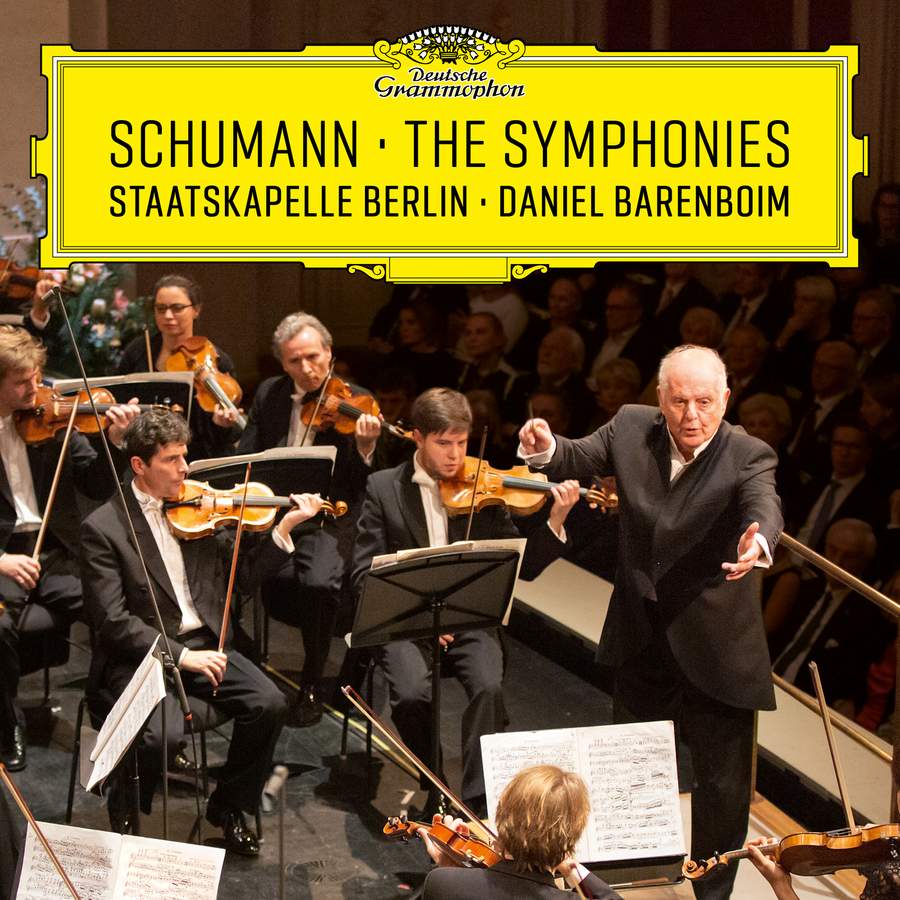SCHUMANN The Symphonies (Barenboim)
View record and artist detailsRecord and Artist Details
Genre:
Orchestral
Label: Deutsche Grammophon
Magazine Review Date: 01/2023
Media Format: CD or Download
Media Runtime: 131
Mastering:
DDD
Catalogue Number: 486 2958

Tracks:
| Composition | Artist Credit |
|---|---|
| Symphony No. 1, 'Spring' |
Robert Schumann, Composer
Berlin Staatskapelle Daniel Barenboim, Conductor |
| Symphony No. 2 |
Robert Schumann, Composer
Berlin Staatskapelle Daniel Barenboim, Conductor |
| Symphony No. 3, 'Rhenish' |
Robert Schumann, Composer
Berlin Staatskapelle Daniel Barenboim, Conductor |
| Symphony No. 4 |
Robert Schumann, Composer
Berlin Staatskapelle Daniel Barenboim, Conductor |
Author: David Threasher
Schumann is naturally a composer close to the heart of Daniel Barenboim’s repertoire, as pianist, chamber musician and conductor. To mark his 80th birthday he has returned to the symphonies once more, following cycles with the Chicago Symphony Orchestra (DG, 3/78, 4/78, 8/79) and, as here, the Staatskapelle Berlin (Teldec, 5/04). Reading back the reviews of those older recordings, one is struck by phrases that could just as well apply here: ‘a real feeling of music being made, not repeated’ (John Warrack in 1979); Barenboim’s ‘big-hearted to-hell-with-it-all approach’ (Rob Cowan in 2004).
And this is no mere remake. True, some of it sounds exactly as you might expect, given the names on the album cover. But although slow music can be very broad – the Spring’s introduction and some (but not all) slow movements – it never lingers and always maintains a sense of inevitability for all its expansiveness. The plushness of the Berlin strings contributes to the bigness of the sound picture; so too the presence within it and the almost brazen confidence of the wind and brass. In faster music, tempos are generally (though not consistently) a notch down on what has lately become fashionable among the smaller outfits; that for the Fourth’s first Lebhaft adds around two minutes to the timings of, say, Zinman (reviewed alongside Barenboim’s last Berlin cycle in 2004) or Dausgaard (BIS, 1/09). But come the finale, Barenboim pips Dausgaard for tempo and leaves Zinman standing, bringing down the curtain on the cycle in riveting style.
So perhaps, despite appearances to the contrary, the veteran conductor has been keeping an ear on what historically informed performers of this music have been up to. Then again, you always know with Barenboim, whether his music-making agrees with you or not, that what he serves up is always intensely personal, often with audible nods to the conductors and styles of his formative years, and never falls cosily back on the dogma of the day. Exposition repeats – these days virtually obligatory – are often ‘chucked as leftover rubble’ (Peter Quantrill on the conductor’s Beethoven – Decca, 9/12). You’ll hear sudden slowings at the approach of second subjects (especially in the finale of the Rhenish). You might even spot the odd moment of orchestral tweaking, à la Mahler, and dynamics are sometimes manhandled for dramatic or architectural effect. But the ear for balance is unfailingly acute, the end result always holding the attention, sometimes for its sheer beauty, sometimes for its provocation.
So while the prevailing fashion is for slimmed-down chamber or period Schumann, revealing the sinew and musculature under the music’s surface, Barenboim is keen to accentuate the beauty of the flesh itself. Not that he ignores the contrapuntal scaffolding on which so much of these symphonies is founded: the Cologne Cathedral movement of the Rhenish is majestic, of course, but its twisting inner lines are still starkly rendered, clearly perceptible through the heat-haze. The preceding Nicht schnell flows beautifully, while the Spring’s Scherzo holds back minutely but just enough to give it an almost Viennese lilt, as if it were the minor-key sibling of the equivalent movement of Schubert’s Great C major.
Nevertheless, the performance to which I suspect I shall return with most pleasure is that of the Second, with its lithe, exquisitely shaped Scherzo and intensely sustained Adagio, fully espressivo as directed. The packaging doesn’t explicitly say whether these recordings come from concert performances but the DG microphones capture a palpably live atmosphere. Happy birthday, Maestro, and may you have many more.
Discover the world's largest classical music catalogue with Presto Music.

Gramophone Digital Club
- Digital Edition
- Digital Archive
- Reviews Database
- Full website access
From £8.75 / month
Subscribe
Gramophone Full Club
- Print Edition
- Digital Edition
- Digital Archive
- Reviews Database
- Full website access
From £11.00 / month
Subscribe
If you are a library, university or other organisation that would be interested in an institutional subscription to Gramophone please click here for further information.




